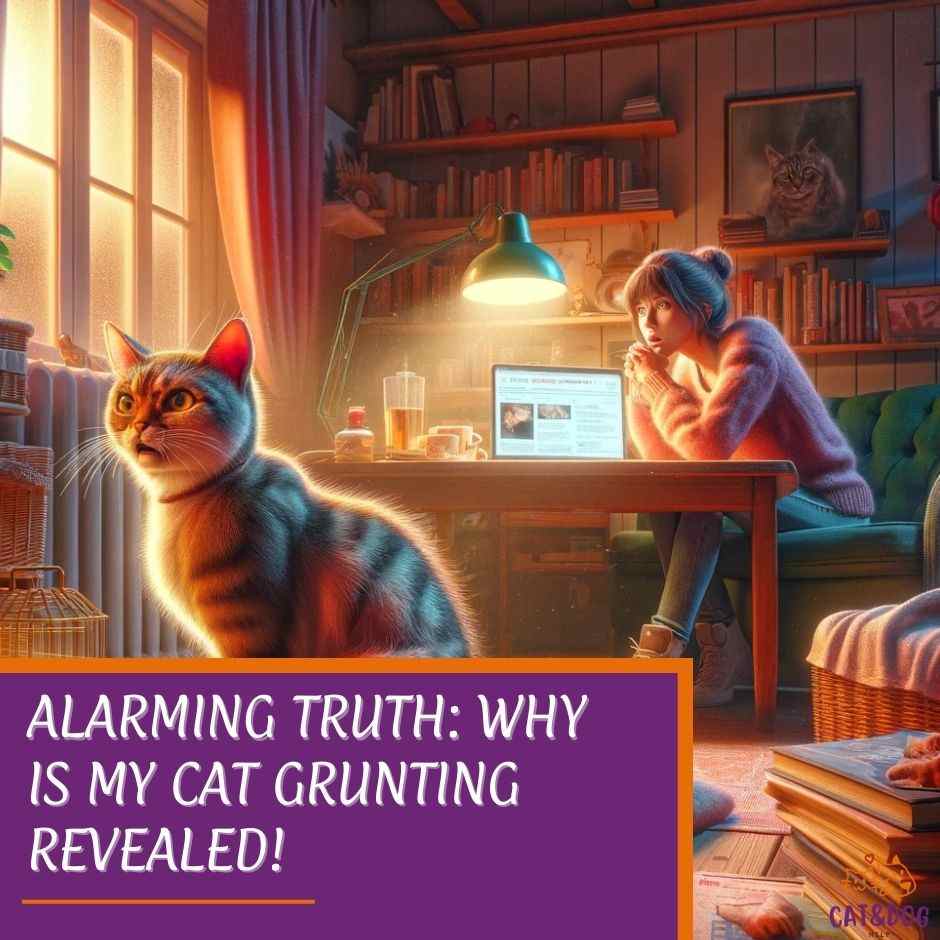Ever caught yourself asking “Why is my cat grunting?” You’re not alone.
Cats, known for their independence and mysterious ways, use an array of vocalizations to express their moods, desires, and sometimes, discomfort.
While some grunts might just be your furry companion’s way of saying hello, other times, it could signal something more significant, such as a cat’s grunting. (1)
Understanding the reasons behind your cat’s grunting behavior can help you address the underlying issue and provide the necessary care and attention for your cat’s health.
It’s important to decipher these grunts to understand your cat’s communication efforts better.
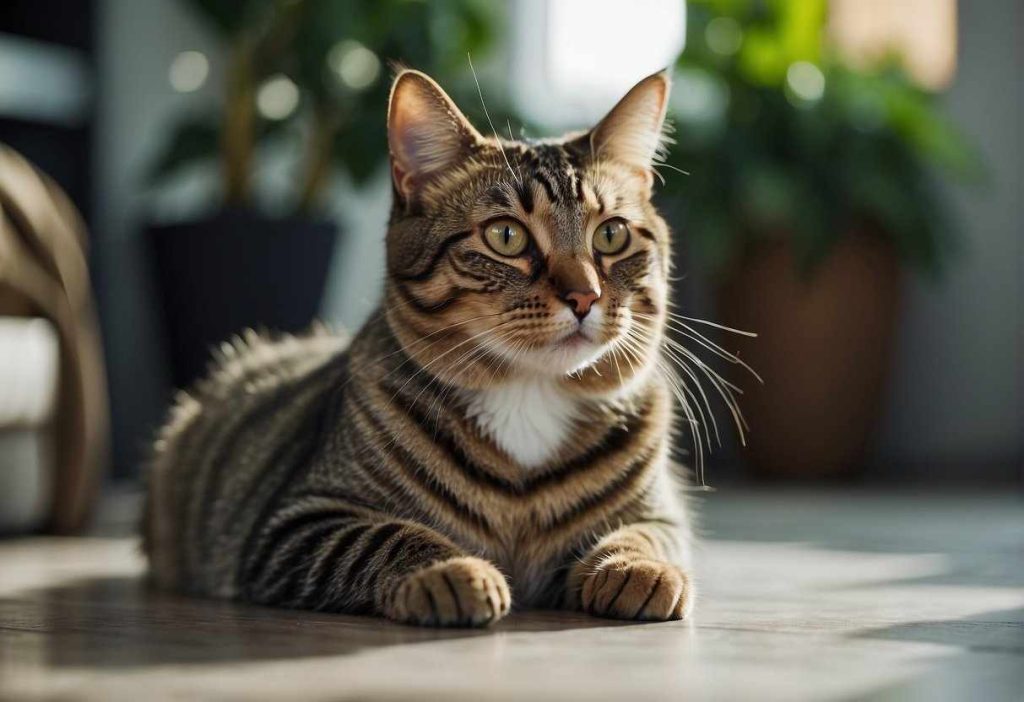
Grunting in cats is not as widely discussed as meowing or purring, yet it’s a sound many owners encounter.
The reasons behind these grunts can range from expressions of annoyance or aggression to signs of contentment. (2)
But, just like humans, if a cat grunts when moving or after eating, it could be a hint of discomfort or pain.
As responsible pet parents, gauging when a grunt is a simple chit-chat or a cry for help is crucial for the well-being of our furry friends.
Key Takeaways
- Grunting can be a normal part of feline communication or an indication of discomfort.
- Cat grunts may express a range of emotions or physical sensations including satisfaction or pain.
- Observing the context and frequency of grunting is vital in understanding and responding to your cat’s needs.
Why is My Cat Grunting: An Overview
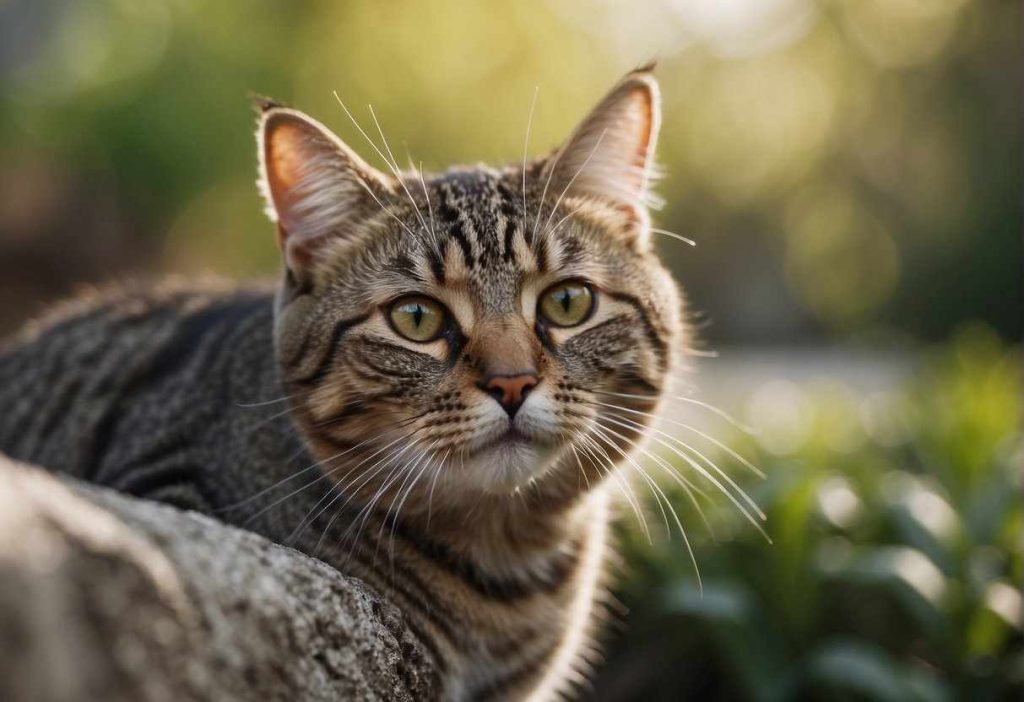
Ever heard a strange sound from your feline friend and wondered, “What’s up with my cat?” Well, cat grunting is a unique vocalization that might sound like a low, soft murmur or a quiet hum.
This sound is produced by the cat’s larynx, which can have abnormalities that cause breathing problems and create this noise, serving as a symptom of the problem.
Don’t worry, you’re not alone in this — many cat owners scratch their heads over this behavior.
What is a Cat Grunting?
In the cat world, grunting is not as common as the famed ‘meow’ or purr, but it’s a sound you might hear when your cat is expressing something. Let’s decode this kitty language:
- A grunt of contentment: Imagine them cozying up in a sunbeam, grunting softly. Ahh, the good life!
- A grunt that spells trouble: Are they hunched over and grunting sharply? That might be discomfort or pain talking.
Why Pay Attention?
Catching on to these little grunts can be a game-changer for your cat’s health. Here’s why staying in tune with your cat’s soundscape matters:
- A happy grunt? That’s your cue that you’re doing something right.
- A grunt mixed with sighs or whimpers? Time to check for other signs of distress.
Remember, you’re the detective here — clues are in their body language. Ears back, dilated pupils, or a puffed-up tail? These can all accompany grunts of fear or pain.
In short, your cat’s grunts can be little secrets they’re trying to tell you, so keep those ears perked! Quick response to their ‘secret codes’ means a happier, healthier kitty on your lap.
Common Reasons Behind Cat Grunting
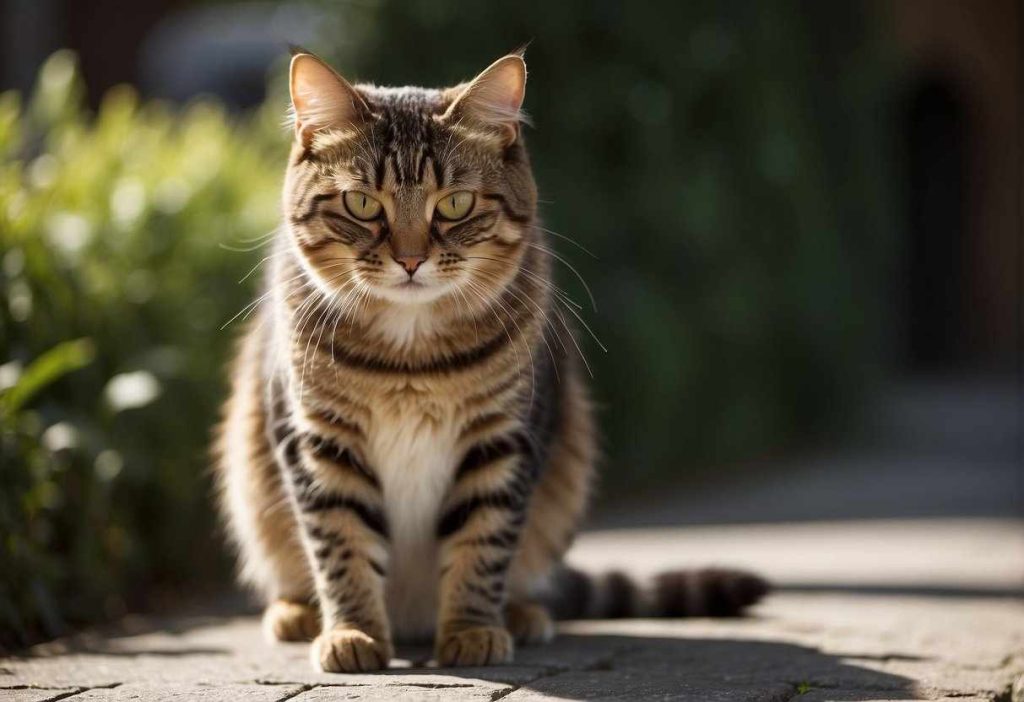
Health-Related Causes of Grunting Sometimes, when your cat lets out a grunt, it’s trying to tell you about discomfort or pain. Imagine your cat had an adventurous leap but landed awkwardly, it might go “Ugh!”.
That could be its way of saying, “That didn’t feel right.”
Indicators of Discomfort or Pain:
- A small yelp while being picked up
- A grunt when settling into their bed
Breathing Difficulties and Obesity Chubby cats are adorable, but those extra pounds can press on their chest, making breathing a workout of its own.
Heavy breathing can often come out as grunting. Is your cat more Garfield than Puss in Boots lately? It might be time to rethink those treats.
Advice for a Healthy Cat:
- Regular vet checkups (3)
- Balanced diet and exercise
Positive Indications of Grunting But hey, not all grunting is a bad sign! Cats have their own language, and grunting can be their way of saying, “I care”.
Communication and Affection:
- A soft grunt when you stroke their favorite spot
- Gentle sounds that welcome you home
Signs of Relaxation Picture this: your cat sprawled in a sunbeam, eyes closed, emitting a contented grunt. That’s the sound of pure bliss! Cats can grunt when they’re in dreamland, too.
If snoring makes us chuckle, kitty grunts will make you smile.
Content Moments to Look For:
- A sleepy grunt before a nap
- Murmurs while cuddling on your lap (4)
Keep an ear out, stay observant, and you’ll learn a lot about your cat’s health and happiness through those grunts!
When to Be Concerned: Grunting as a Health Indicator
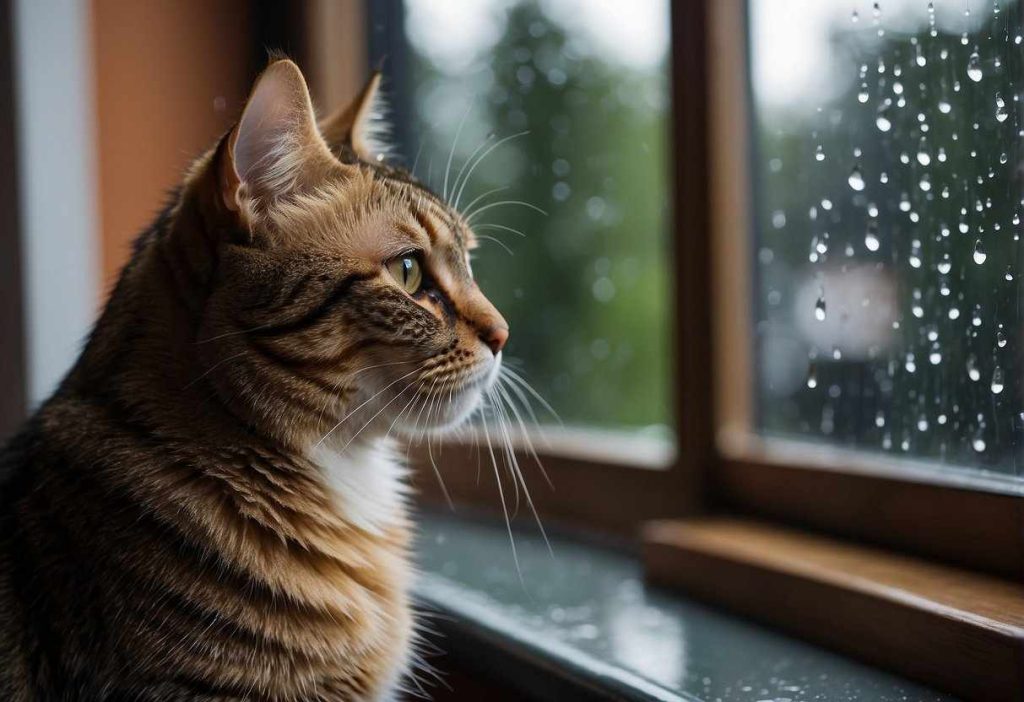
Recognizing Abnormal Grunting:
- Consistency: Is your cat grunting more often than usual?
- Volume: Are the grunts louder or more pronounced than before?
- Associated Behavior: Does your cat exhibit other signs of distress, like hiding or changes in appetite?
Consulting a Veterinarian: When should you start dialing the vet’s number? Here are some signs:
- Persistent Grunting: If grunts persist over an extended period.
- Behavioral Changes: If grunting accompanies a shift in your cat’s usual demeanor.
- Physical Symptoms: Look out for symptoms like limping, reluctance to jump, or changes in breathing.
If it’s vet time, make sure to provide a clear history of your cat’s symptoms, including:
- Duration: How long has the grunt-fest been going on?
- Intensity: Has it been getting louder or more frequent?
- Triggers: Does cuddle time or meals seem to set it off?
Remember, even if your cat’s grunting turns out to be benign, your vet will appreciate the heads-up. Better safe than sorry, right? Plus, you’ll get peace of mind knowing your whiskered pal is in tip-top shape!
Keep these tips in your back pocket, and you’ll be the ultimate cat health detective.
Don’t forget to take a video of your cat while it is making these noises as evidence for your vet to better understand the situation, especially if there are any breathing changes.
This can help determine if the grunting is due to relaxation or a potential health problem.
Behavioral Aspects of Cat Grunting
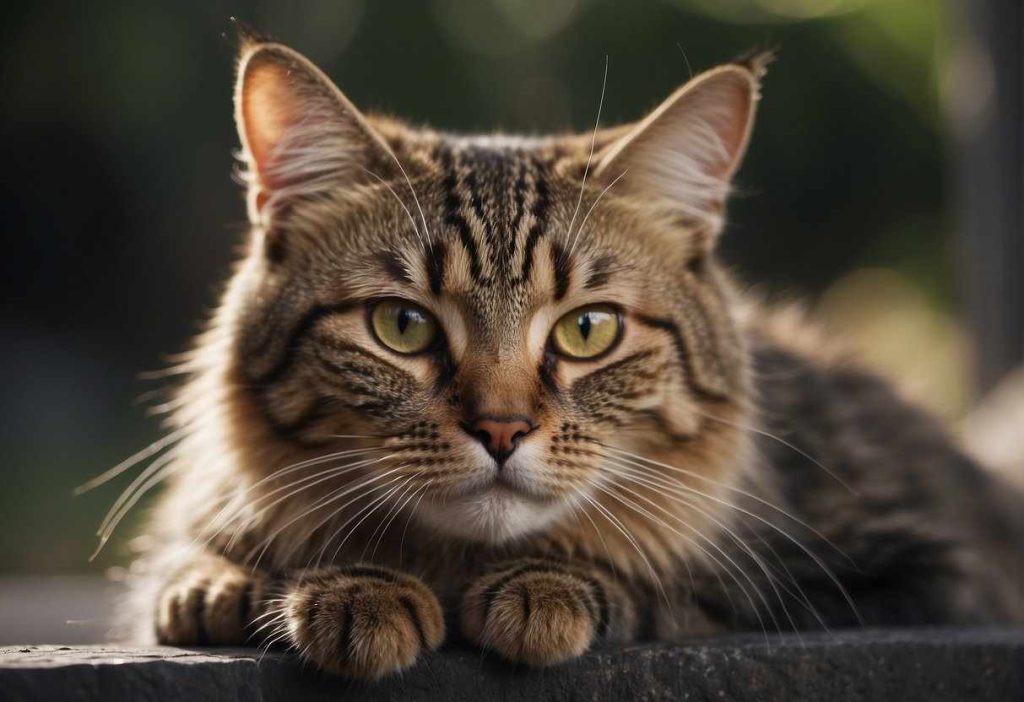
Grunting During Physical Activities
Remember, even if your cat’s grunting turns out to be benign, your vet will appreciate the heads-up. Better safe than sorry, right? Plus, you’ll get peace of mind knowing your whiskered pal is in tip-top shape!
Keep these tips in your back pocket, and you’ll be the ultimate cat health detective. Don’t forget to take a video of your cat while it is making these noises as evidence for your vet to better understand the situation.
This can help determine if the grunting is due to relaxation or a potential health problem.
Grunting as a Behavioral Trait
Did you know some cats might just be chatterboxes? While there’s no concrete list, anecdotal evidence suggests that certain cat breeds, such as Persians and Exotic Shorthairs, could be more vocal with their grunts, much like they are with their meows. It’s their purr-sonality shining through!
- Breed-Specific Tendencies:Persians: More vocal, and may grunt as part of their dialogue.
- Exotic Shorthairs: Similar to Persians, likely to express themselves with grunts.
Cats use a variety of sounds to communicate, and grunting is just one quirk in their repertoire. (5)
It’s a more guttural alternative to the meow, and once you get to know your cat, you’ll start to notice what each little noise means.
Understanding the different sounds your cat makes, including grunting, is crucial to deciphering their emotions and needs. (6)
Paying attention to your cat’s body language while they grunt is also important in understanding their behavior. Isn’t it amazing how expressive our whiskered companions can be?
Keep an ear out next time you’re playing with your cat – their grunts could be a sign of a really good time!
Case Studies
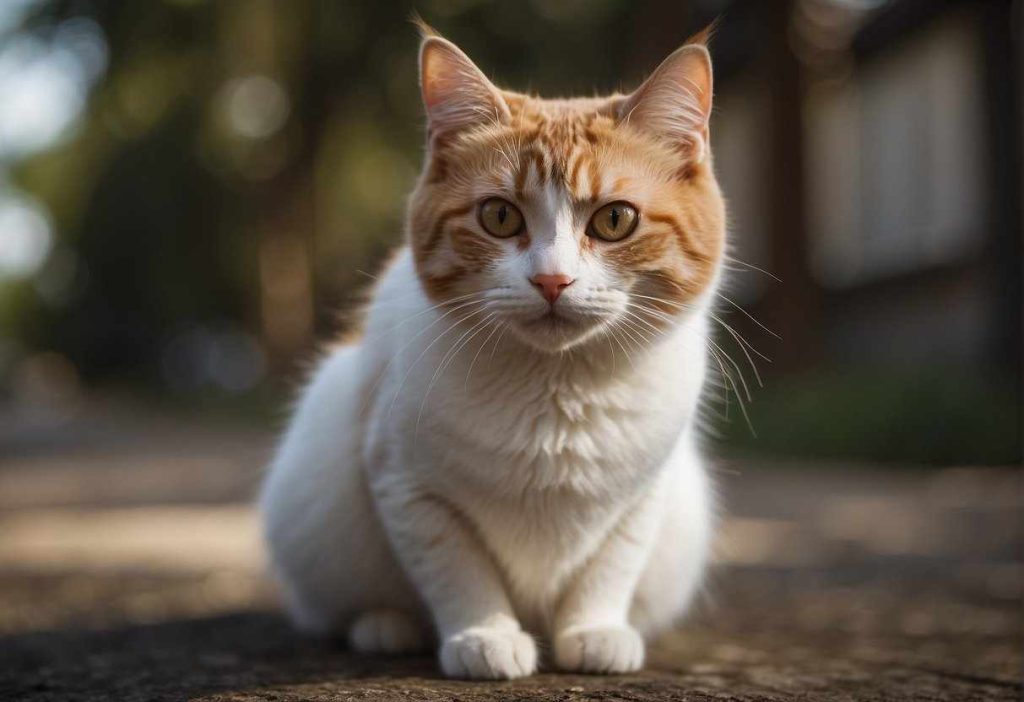
Ever wondered if your feline friend grunting might be hinting at something more? Let’s look at some real-life scenarios to satisfy your curiosity!
Case Study #1: Sleepy Grunts Do you sometimes hear a gentle grunt when your furball is dozing off? You might just be listening to the cat version of a contented sigh.
Picture Lola, a tabby who grunts softly as she slips into dreamland—a sign she’s relaxed and at ease.
- Case Study #2: Obesity and Breathing Issues Consider Oliver, a chunky feline whose excess weight leads to grunting. Carrying extra pounds can put pressure on their chest and airways, making it harder to breathe. It’s not as adorable as it sounds; it’s a call to help your whiskered pal lose some weight for a healthier lifestyle.
| Reason for Grunting | Example | Insights |
| Sleepiness | Lola’s Sighs | Indicates relaxation and comfort |
| Obesity | Oliver’s Struggles | Weight management needed |
Remember, these sounds aren’t just quirky traits; they could be clues to your cat’s well-being!
From telling you they love your petting (yes, they do that) to signaling a mighty leap or expressing discomfort after a meal, each grunt holds a story.
Have you witnessed your kitty making a strange sound after a feisty leap? That’s them showing off their athleticism—or in Jasper’s case, a reminder that he’s still got it, even if the landing was less than graceful.
So next time you hear that peculiar noise, take a moment to observe. Your fuzzy companion might just be chit-chatting—or, it could be time to reassess those extra treats.
Keep those ears perked, and you’ll learn a whole new language!
Practical Strategies for Cat Owners
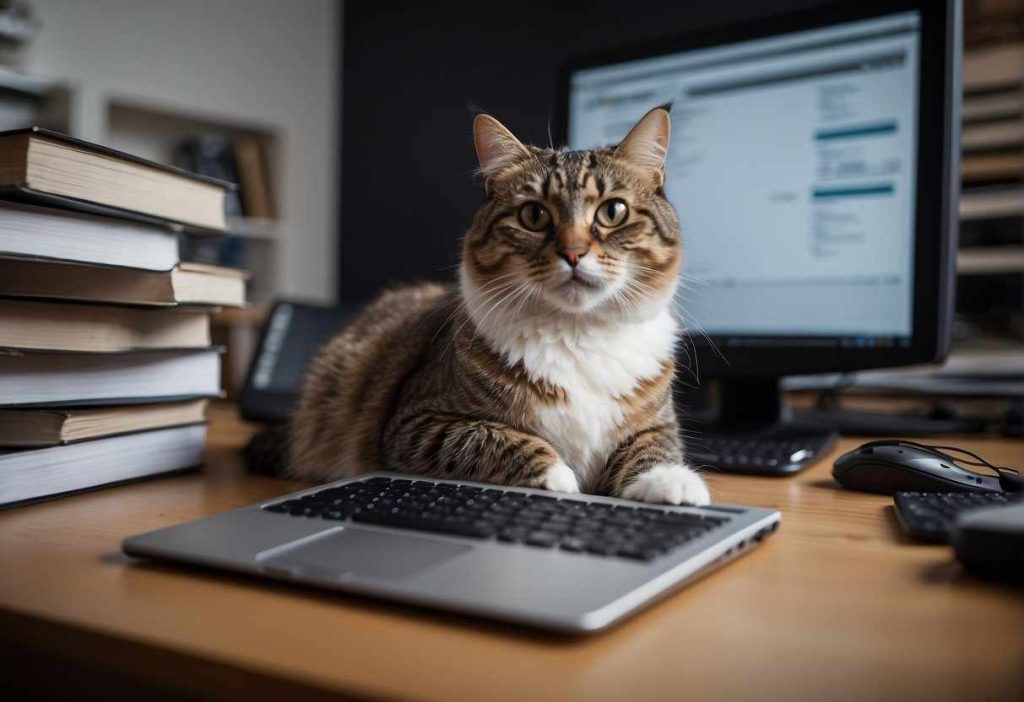
Responding to Your Cat’s Grunting
Grunting could just be one of your cat’s quirks, but it’s good to stay informed and proactive. Here’s how you can respond:
- Be Observant: Notice when the grunting occurs; is it during play, rest, or while breathing?
- Environmental Comfort: Ensure your cat has a cozy space. Is their bed in a quiet corner? A comfortable environment can reduce stress and therefore, any grunting related to it.
Comforting Techniques
Whether they’re just chatty or trying to tell you something, remaining calm is key:
- Keep Them Calm: Soft music or a gentle petting session might just do the trick.
- Space Matters: Respect their space. Cats are territorial, and sometimes they simply need a little ‘me-time’.
Recording and Reporting
- Detail the Grunt: What does it sound like? How long does it last? When does it happen?
- Track the Habit: Keep a log. Does the grunting follow a pattern? This might help your vet understand what’s going on.
Bonus Tip: A video or audio recording can be golden for your vet visit!
So, keep these pointers in mind, and remember, a grunt could simply be your cat’s way of saying, “Hey, you!” But it’s always smart to play it safe.
Keep a log, observe the scene, and when in doubt, reach out to your vet. Stay pawsitive!
Enhancing Understanding of Cat Grunting
Ever wondered when you hear a soft grunt coming from your feline friend what’s going on in their cute little head? Well, you’re not alone! Grunting in cats can seem puzzling, but let’s decode the mystery.
Common Reasons for Grunting:
- Communication: Just like you might hum a tune when content, your cat may grunt to express a range of emotions from pleasure to annoyance.
- Discomfort or Pain: If your kitty’s grunt comes off more like a groan, they could be telling you they’re not feeling top-notch.
- Breathing Issues: Cats carrying a few extra pounds might grunt due to narrowed airways or other respiratory conditions.
Tips for Monitoring and Responding to Grunting:
- Normal or Not? Pay attention to when your cat grunts—is it during a cozy nap or after struggling to jump up onto the sofa?
- Observe and Assess: Look for other signs of distress or changes in behavior. Are there any changes in appetite or litter box habits?
- Visit the Vet: When in doubt, a vet check-up can provide peace of mind and ensure your furry friend is healthy. (7)
Further Resources and Expert Opinions:
Recommended Readings and Studies:
- “The Vocal Language of Cats” by Dr. Meowington
- “Feline Behavior and Health” – Journal of Companion Animal Studies
- “Understanding Your Cat’s Body Language” by Purrlina Whiskerface
Remember, each grumble and grunt is a conversation starter with your cat. By tuning into these subtle cues, you can better understand and care for your purring pal.
And if your instincts tell you something’s off, don’t hesitate to consult your vet. After all, it’s better to be safe than sorry when it comes to our furry family members!
Quick Recap
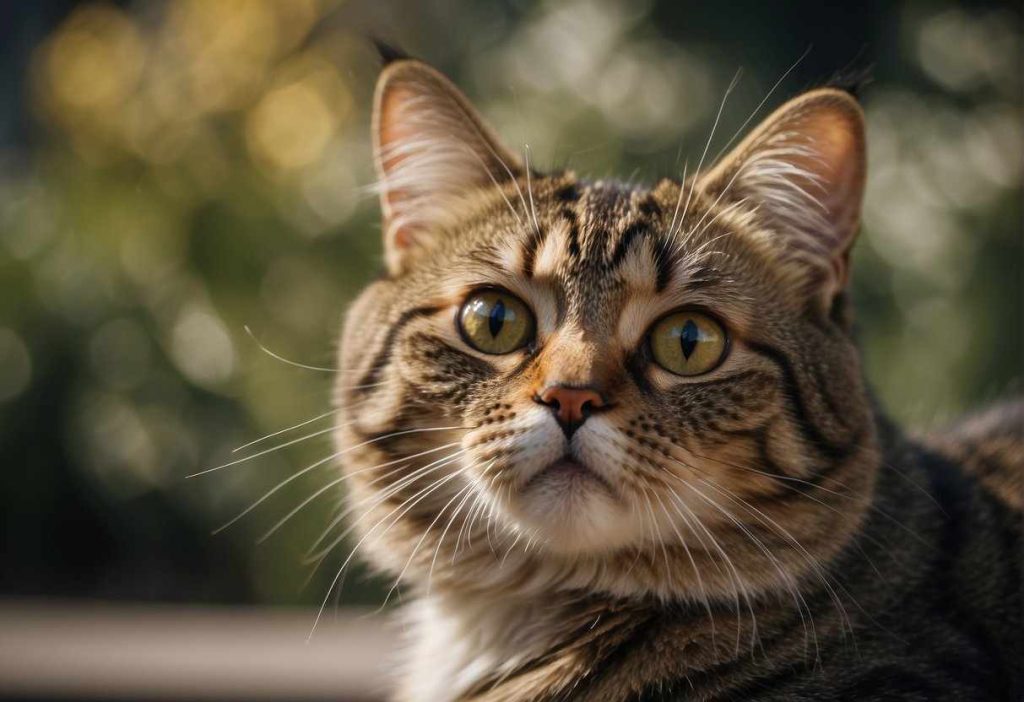
Let’s quickly touch on what we’ve covered:
- Comfort or Discomfort: Your cat’s grunts might be a cozy purr-like sound indicating they’re content. But if the grunt sounds strained, it could signal discomfort or pain.
- Communication: Cats may grunt to communicate various emotions such as aggression or fear. A low grunt could mean, “Back off!” while a softer one might simply say, “I’m here.”
Reasons Cats Grunt:
- Health Conditions: Persistent grunting can be a sign of health issues. Keep an eye out for other symptoms and consider a vet visit if grunting is continuous.
- Digestive Discomfort: An upset stomach can lead to grunting. Think about their recent meals—was there a new treat on the menu?
Cat Owner’s Checklist:
- Observe your cat’s body language.
- Note changes in behavior or eating habits.
- Consult your vet if grunting is accompanied by other symptoms.
Remember, proactive care is key. Cats might not speak our language, but their sounds, like grunting, are their way of trying to tell us something.
It’s up to us, their beloved owners, to listen and decipher what they need. Stay attentive to these audible hints and you’ll strengthen the bond with your whiskered companion, ensuring they stay happy and healthy!
Frequently Asked Questions
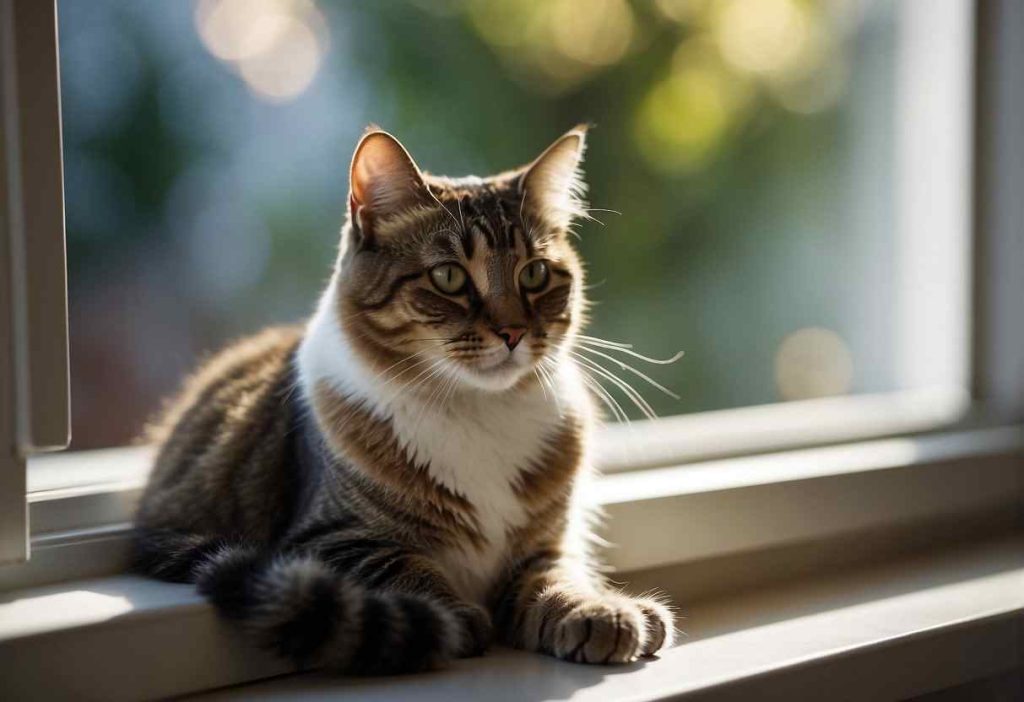
When your feline friend starts grunting, it’s natural to have a flurry of questions. Let’s dive right into some of the most frequently asked questions about this quirky cat behavior to put your mind at ease.
What are the most common health issues indicated by cat grunting?
If your cat is grunting, they might be experiencing discomfort related to health concerns like obesity, respiratory issues, or even pain from an injury.
Keep an eye out for any additional signs of illness and consult your vet if you’re concerned.
How can I differentiate between normal and abnormal grunting in my cat?
Normal cat grunting could often be short, infrequent, and appear during content moments.
In contrast, abnormal grunting tends to be persistent, sounds strained or happens in conjunction with other worrisome symptoms like lethargy or loss of appetite.
Should I be worried if my cat grunts while sleeping?
Occasional grunting in sleep may not be a cause for worry; it can simply be a sign of dreaming.
However, if your cat repeatedly grunts while asleep and seems to struggle for breath, it’s time to consult your vet.
What should I do if my cat starts grunting suddenly?
Sudden and unusual grunting can be a red flag. Watch for accompanying behaviors, such as decreased activity or aggressiveness.
It’s best to err on the side of caution and schedule a vet visit.
What does it mean if my cat grunts when being lifted, and how should I handle it?
Grunting when lifted might signal discomfort or pain. Ensure you’re picking up your cat correctly—supporting their chest and hindquarters.
If the grunting persists, it’s best to seek a vet’s opinion
Is grunting a way for cats to communicate with their owners?
Cats have a rich repertoire for communication, and a grunt could be their way of saying “hello” or “pay attention to me.”
Notice the context of the grunting to understand what your cat might be trying to convey.
Can kittens grunt as much as adult cats?
Kittens may grunt as well, often as a part of their learning to vocalize and communicate.
If the grunting isn’t combined with signs of distress, it’s generally not a cause for concern.
However, kittens are delicate, so keeping an eye on any unusual behavior is always wise.
- Advantages of Playing Casino Online - July 6, 2025
- How players can take advantage of the no deposit bonus at the Casino - July 5, 2025

